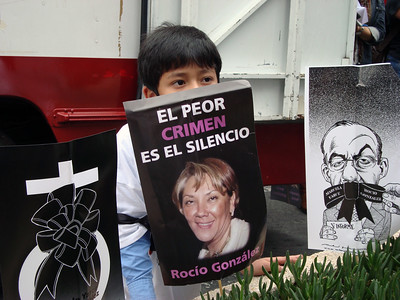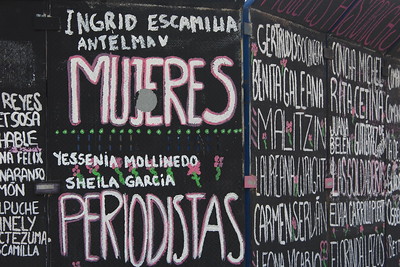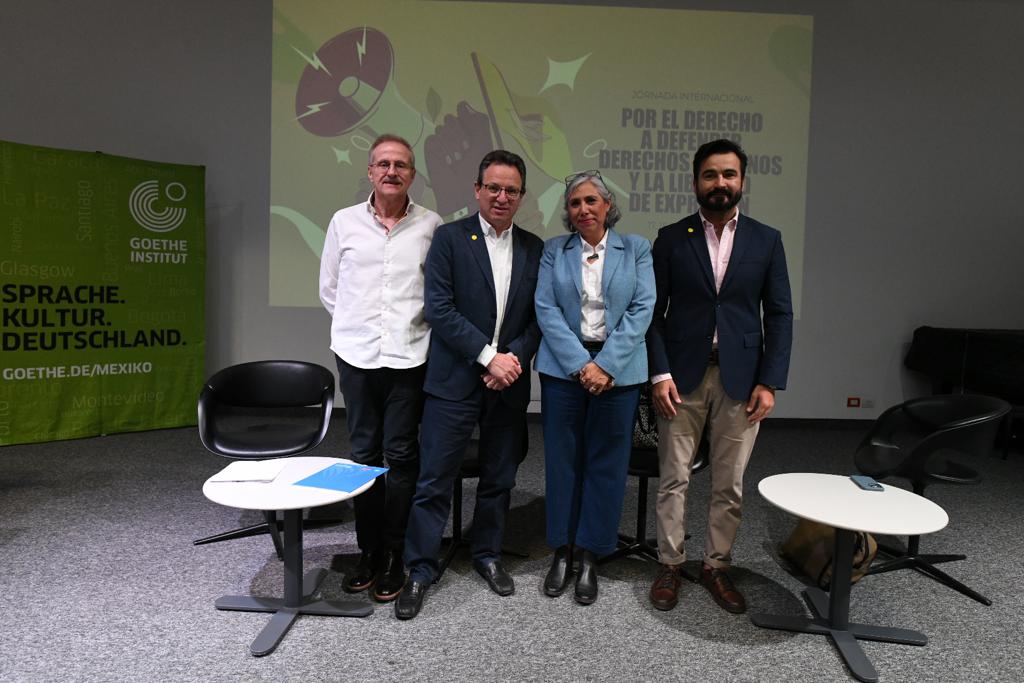Ciudad de México.- El papel que juega la sociedad civil en la generación de políticas públicas es imprescindible y necesario, si se pretende contar con políticas que realmente generen entornos seguros para la labor de defensa y libertad de expresión.
El pasado 17 de mayo el Espacio OSC -una articulación de 14 organizaciones que monitorea y propone reformas y mejoras a la actual política de protección en México- organizó dicho evento que contó con la presencia de autoridades federales, cuerpo diplomático, ONU-DH México, expertas internacionales, personas defensoras y periodistas.
La jornada tuvo cuatro ejes de discusión: los procesos de construcción de políticas públicas para la protección; la gobernanza en red y la coordinación interinstitucional; el papel del poder judicial y las fiscalías en la investigación, y el papel de la sociedad civil en esta construcción de políticas públicas de protección en la región.
En torno a la reflexión de cómo han sido los procesos de construcción de políticas de protección, la Unidad de Protección a Defensoras y Defensores de Derechos Humanos de Guatemala (UDEFEGUA) destacó que la emisión de una sentencia de la CoIDH de 2014 dio lugar a un Mecanismo de Protección, donde la sociedad civil ha tenido un papel decisivo a través de mesas de trabajo. En tanto, para la dirección de Derechos Humanos del Ministerio de Defensa Nacional de Colombia, la política de protección se ha centrado en la seguridad física, pero se requiere una política pública integral, holística y sistémica que genere entornos que garanticen el derecho a defender derechos humanos y la libertad de expresión acorde a estándares internacionales.

Por su parte, Protection International reconoció el papel que ha desempeñado el Espacio OSC durante sus más de 10 años de trabajo, colocándolo como uno de los referentes regionales que ha propuesto insistentemente técnica y reflexión en torno a la protección en México.
Con relación a la gobernanza en red y la coordinación interinstitucional, la Coordinadora de Derechos Humanos de Paraguay manifestó que pese a que existe un Mecanismo de protección de testigos este no tiene una dimensión sobre derechos humanos y su principal reto es la coordinación entre entidades y sociedad civil, así como un presupuesto que sea destinado a este ente anualmente.
Desde Brasil, el Programa de Protección que fue creado en 2004 enfrenta el reto de contar con presupuesto limitado, poca participación de sociedad civil, excluye a los pueblos indígenas, existe una débil articulación de políticas públicas en materia de derechos humanos en medio de retrasos en procesos de justicia.
El panorama mexicano
En Veracruz, a 10 años de la creación de la Comisión Estatal para la Atención y Protección de Periodistas, se ha tenido que pensar cómo dejar de actuar reactivamente y pensar en la prevención, ampliando y construyendo un sistema de protección estatal, convenciendo a las autoridades estatales para hacer efectiva la garantía de derechos.
En torno al papel que deben desempeñar las diferentes instancias y procesos judiciales, se dio un diálogo entre el Centro por la Justicia y el Derecho Internacional (CEJIL), Propuesta Cívica y la Fiscalía Especializada en Investigación de Violaciones a los Derechos Humanos y Desaparición Forzada del Estado de Chihuahua, donde estuvieron conversando acerca de los logros, necesidades y retos que hay desde este punto en torno a la protección y al desarrollo de la labor de defensa y la libertad de expresión.
Se hizo mucho hincapié en la necesidad de poder tener buenos análisis de contexto, sobre todo en contextos de macrocriminalidad, con el objetivo de poder esclarecer ataques y también para identificar patrones que permitan vincularlos a otros, así como en la necesidad de que las sentencias condenatorias vayan acompañadas siempre de medidas preventivas y restaurativas. En este sentido apuntaban como primordial las labores de prevención y protección que pueden darse desde las Fiscalías, incorporando los enfoques de DDHH, género e interseccionalidad, guiando al conjunto de actores que están involucrados en las investigaciones y proporcionando medidas de protección, de forma complementaria a otras instituciones como el Mecanismo Federal.

Para Sara Méndez, integrante del Consejo Consultivo del Mecanismo Federal, el papel que ha tenido la sociedad civil a la hora de abrir algunos canales institucionales, pese a las resistencias, ha sido de suma importancia para avanzar en políticas y herramientas que ayudan a proteger a defensores y periodistas.
Desde PBI México, se puso en valor la labor de articulación que ha realizado en sus más de 10 años el Espacio OSC, mismo que se ha materializado, entre otros elementos, en la consecución del actual marco legislativo en torno a la protección de defensores y periodistas, pero también en el intercambio de experiencias, buenas prácticas y cuidados colectivos entre organizaciones y personas de todo el territorio mexicano.
Frente a un contexto de violencias múltiples en la región, que la posicionan como la región más peligrosa para defender derechos humanos y la libertad de expresión, “es necesario seguir pensando en rutas de acción colectiva con la participación de la sociedad civil para generar políticas de protección estatales”, sentenciaron.
* El Espacio OSC es una articulación de 14 organizaciones que monitorea y propone reformas y mejoras a la actual política de protección en México. Inspirados en el trabajo en red, el Espacio busca potencializar la labor en pro de las personas defensoras y periodistas, desde un enfoque interseccional, de género, colectivo y comunitario.
–
Protection policies for women defenders and journalists in Latin America: progress and challenges.
The role played by civil society in the generation of public policies is essential and necessary, if we want to have policies that truly generate safe environments for the labor of defense and freedom of expression.
On May 17, Espacio OSC organized the International Seminar on Protection Policies for Human Rights Defenders and Journalists in Mexico City. The event was attended by federal authorities, diplomatic corps, UN-HR Mexico, international experts, human rights defenders and journalists. The event had four main areas of discussion: the processes of construction of public policies for protection; network governance and inter-institutional coordination; the role of the judiciary and prosecutors in the investigation, and the role of civil society in the construction of public policies for protection in the region.
Regarding the reflection on the processes of building protection policies, the Unidad de Protección a Defensoras y Defensores de Derechos Humanos de Guatemala (UDEFEGUA) highlighted that the issuance of a judgment of the IACHR in 2014 gave rise to a Protection Mechanism, where civil society has played a decisive role through working groups. Meanwhile, for the Human Rights Directorate of the Colombian Ministry of National Defense, the protection policy has focused on physical security, but a comprehensive, holistic and systemic public policy is required to generate environments that guarantee the right to defend human rights and freedom of expression in accordance with international standards.
For the Protection Mechanism of Mexico City, the territorial experience has been fundamental to create comprehensive care processes that respond to the needs of the beneficiaries, broadening the view on the types of threats, vulnerabilities, patterns of aggressions and levels of risk.
Protection International recognized the role played by Espacio OSC during its more than 10 years of work, placing it as one of the regional references that has insistently proposed techniques and reflection on protection in Mexico.
In relation to network governance and inter-institutional coordination, the Human Rights Coordinator of Paraguay stated that although there is a Witness Protection Mechanism, it does not have a human rights dimension and its main challenge is coordination between entities and civil society, as well as a budget that is allocated to this entity annually. From the experience of CEDEHM in Chihuahua, it was vital to carry out a diagnosis on the origins of the risk for journalists and defenders that led to an Early Warning in 2016.
This prompted the publication in 2017 of the Contingency Plan as a preventive rather than reactive measure. In Veracruz, 10 years after the creation of the State Commission for the Attention and Protection of Journalists, it has been necessary to think about how to stop acting reactively and think about prevention, expanding and building a State Protection System, convincing State authorities to make the guarantee of rights effective.
In Brazil, the Protection Program, created in 2004, faces the challenge of having a limited budget, little participation of civil society, exclusion of indigenous peoples, weak articulation of public policies on human rights amidst delays in the justice process.
Regarding the role that the different judicial bodies and processes should play, there was an interesting dialogue between the Center for Justice and International Law (CEJIL), Propuesta Cívica and the Special Prosecutor’s Office for the Investigation of Human Rights Violations and Forced Disappearances of the State of Chihuahua, where they discussed the achievements, needs and challenges that exist from this point regarding the protection and development of the work of defense and freedom of expression.
Much emphasis was placed on the need to have good context analysis, especially in contexts of macro-criminality, in order to be able to clarify attacks and also to identify patterns that allow linking them to others, as well as the need for convictions to always be accompanied by preventive and restorative measures. In this sense, they pointed out that the prevention and protection work that can be carried out by the Prosecutor’s Offices, incorporating human rights, gender and intersectionality approaches, guiding all the actors involved in the investigations and providing protection measures, in a complementary manner to other institutions such as the Federal Mechanism, is of paramount importance.
Although there have been advances in the protection of journalists through a standardized investigation protocol for crimes against this group, all the speakers agreed on the need to create similar protocols for crimes and aggressions against human rights defenders, as an element that would help to improve and guarantee their legitimate work, as well as better coordination between state prosecutors’ offices and the FGR.
As highlighted throughout the day, the role played by civil society in the generation of public policies is essential and necessary, if we want to have policies that really generate safe environments for the work of defense and freedom of expression. The Colombian organizations ACIN and CRIC focused on indigenous, collective and community experiences in the area of protection, which provide a value and an approach that, as a general rule, have not been taken into account by governmental actors, despite the knowledge and contributions they treasure. This resistance to the role that communities and civil society organizations can play was also emphasized by Somos Defensores Colombia.
For Sara Méndez, member of the Advisory Council of the Federal Mechanism, the role played by civil society in opening some institutional channels, despite resistance, has been of utmost importance to advance policies and tools that help protect defenders and journalists. PBI Mexico highlighted the work of articulation that the Espacio OSC has carried out in its more than 10 years of existence, which has materialized, among other elements, in the achievement of the current legislative framework for the protection of defenders and journalists, but also in the exchange of experiences, good practices and collective care among organizations and individuals throughout Mexico.
Faced with a context of multiple violence in the region, which positions it as the most dangerous region for defending human rights and freedom of expression, it is necessary to continue thinking about collective action routes with the participation of civil society in order to generate state protection policies.
* Espacio OSC is an articulation of 14 organizations that monitors and proposes reforms and improvements to the current protection policy in Mexico. Inspired by networking, Espacio seeks to strengthen the work on behalf of human rights defenders and journalists, from an intersectional, gender, collective and community approach.

